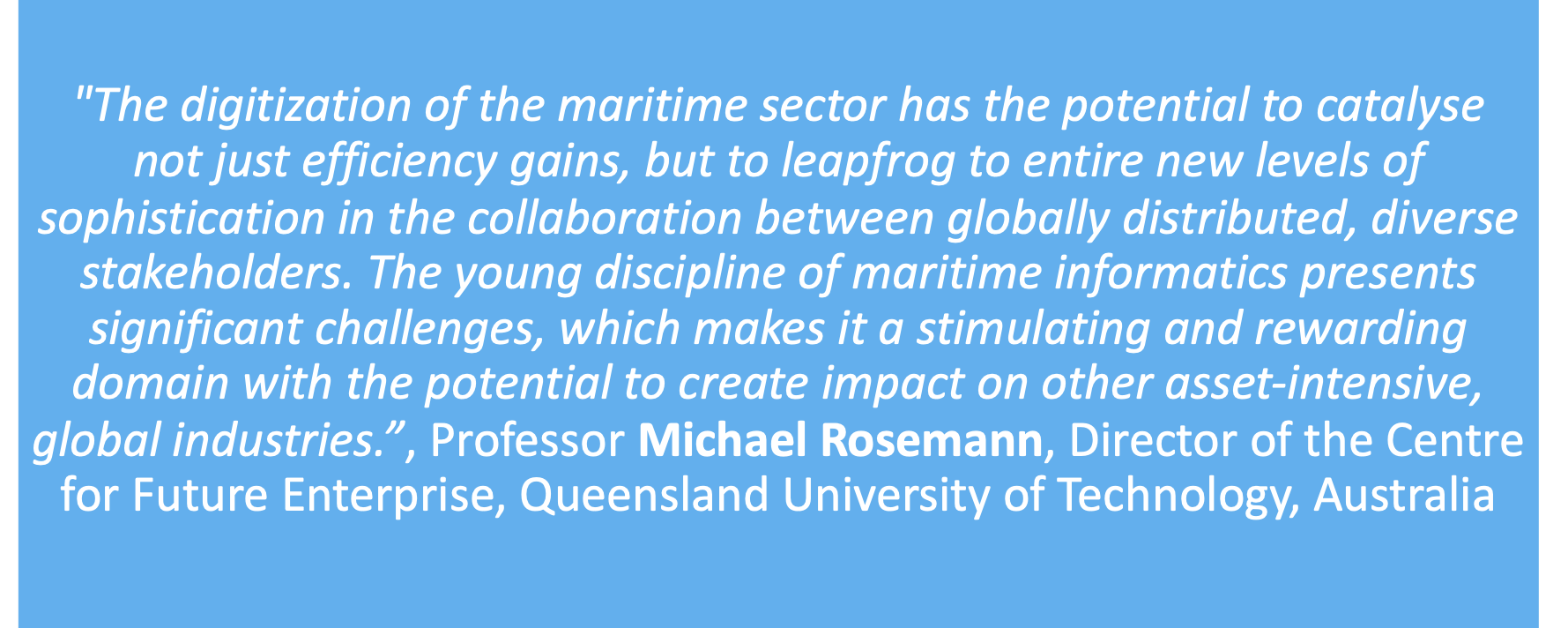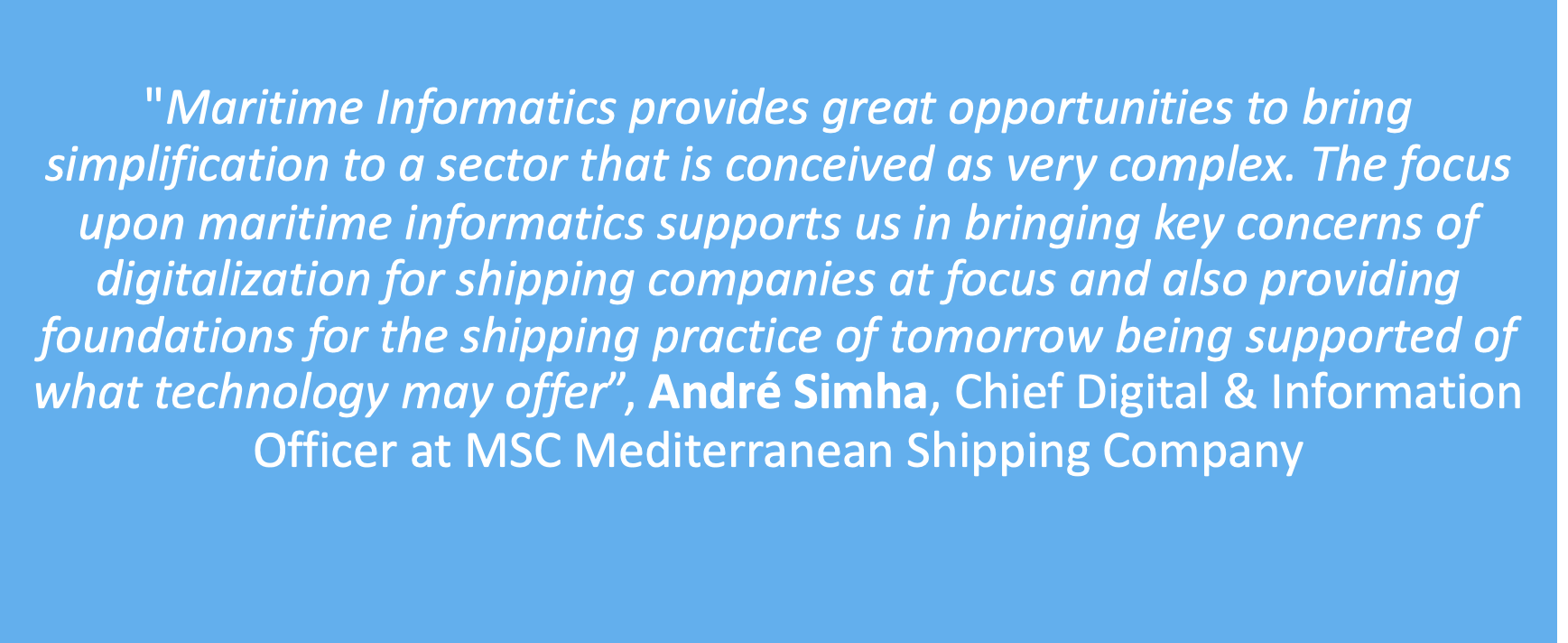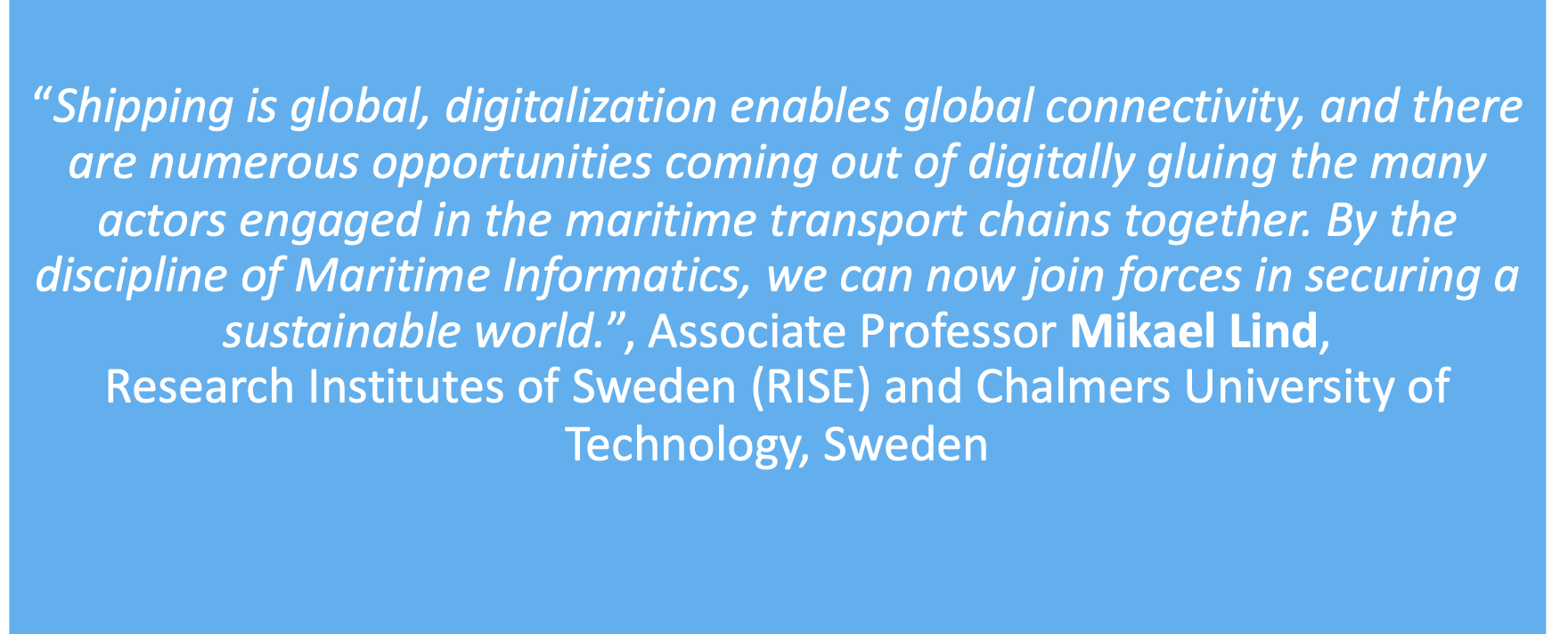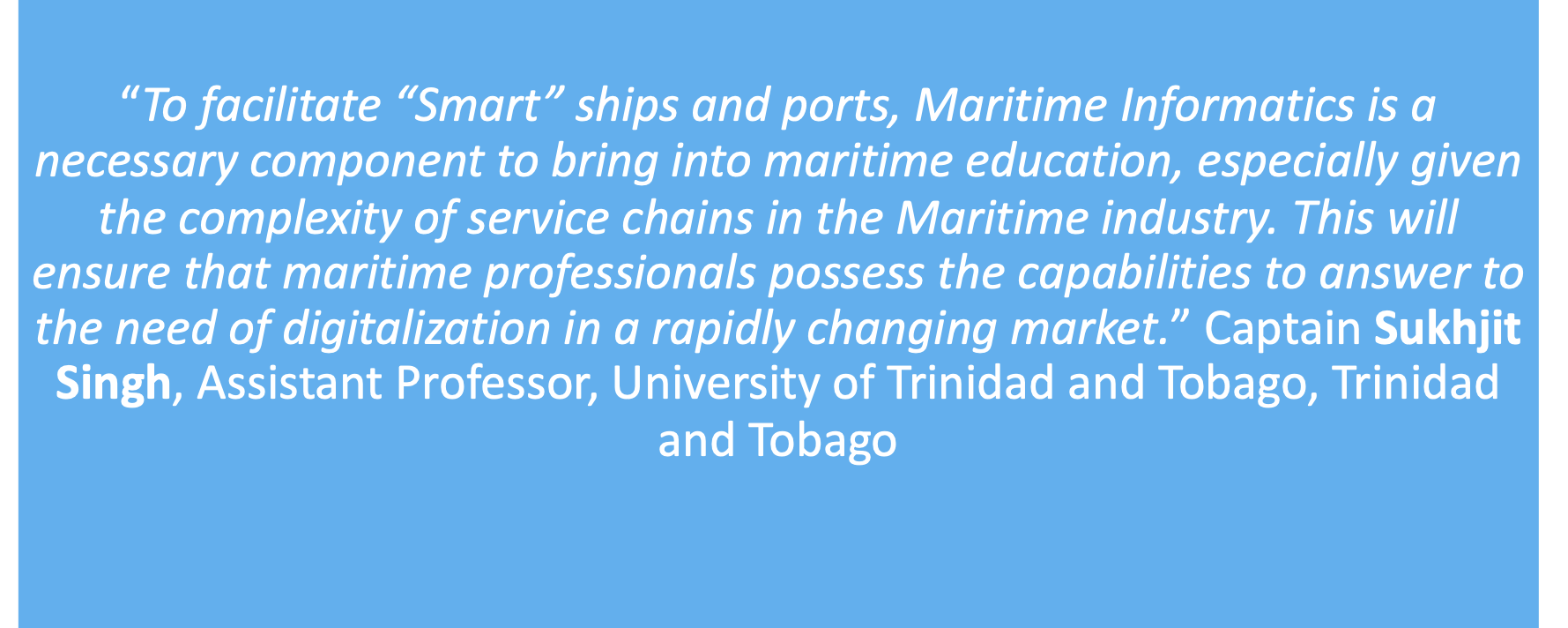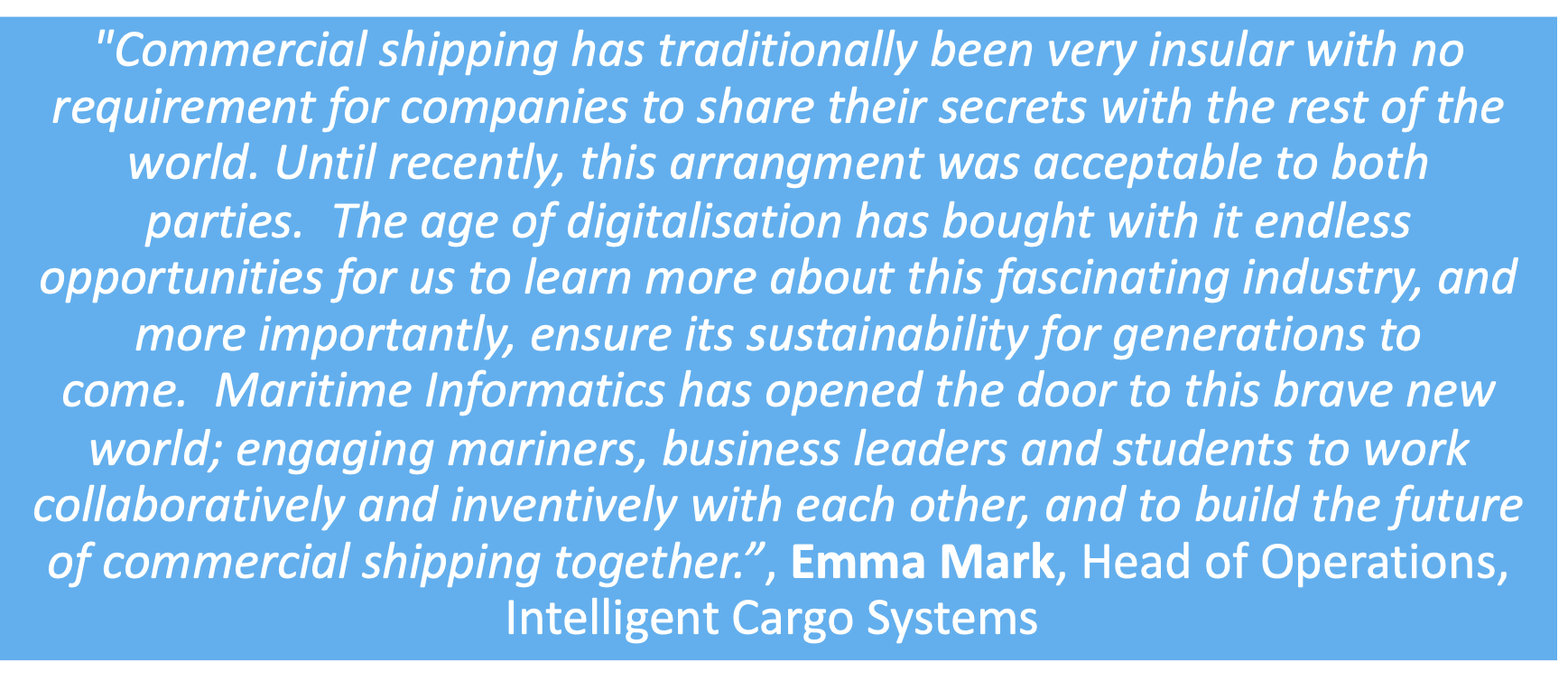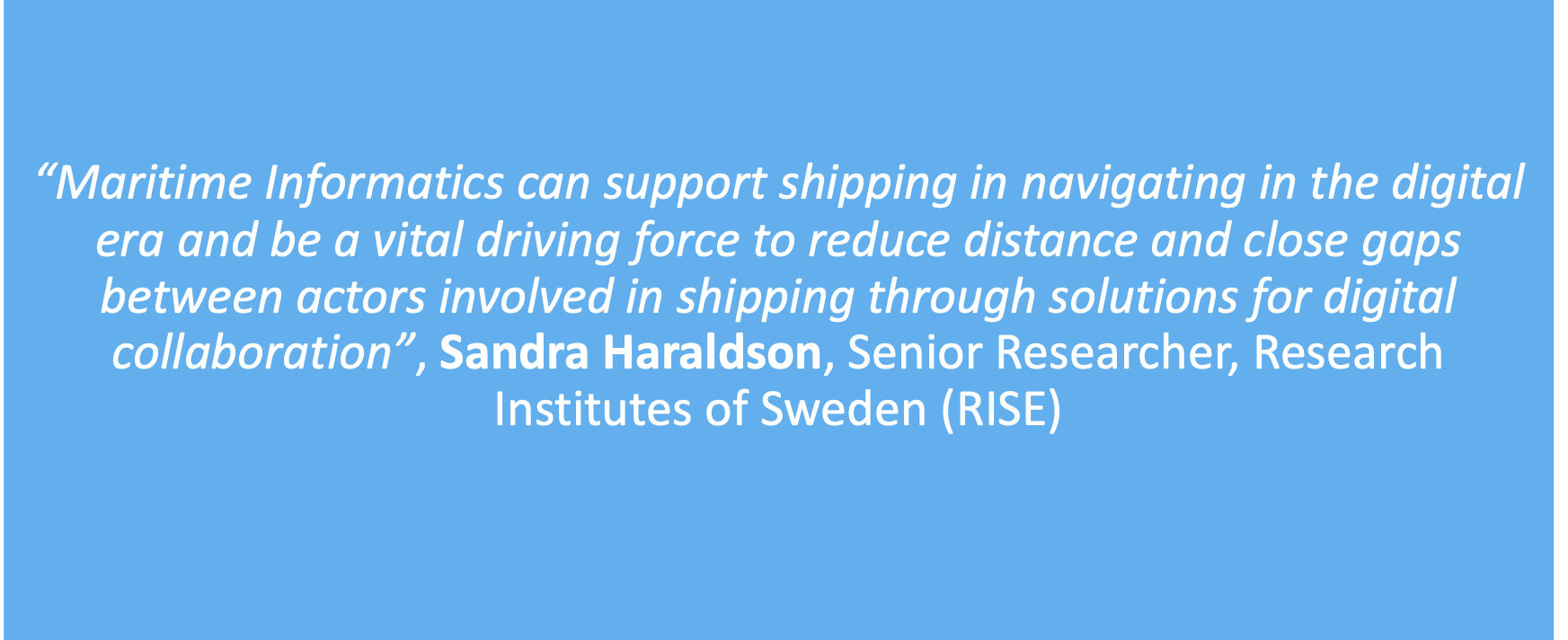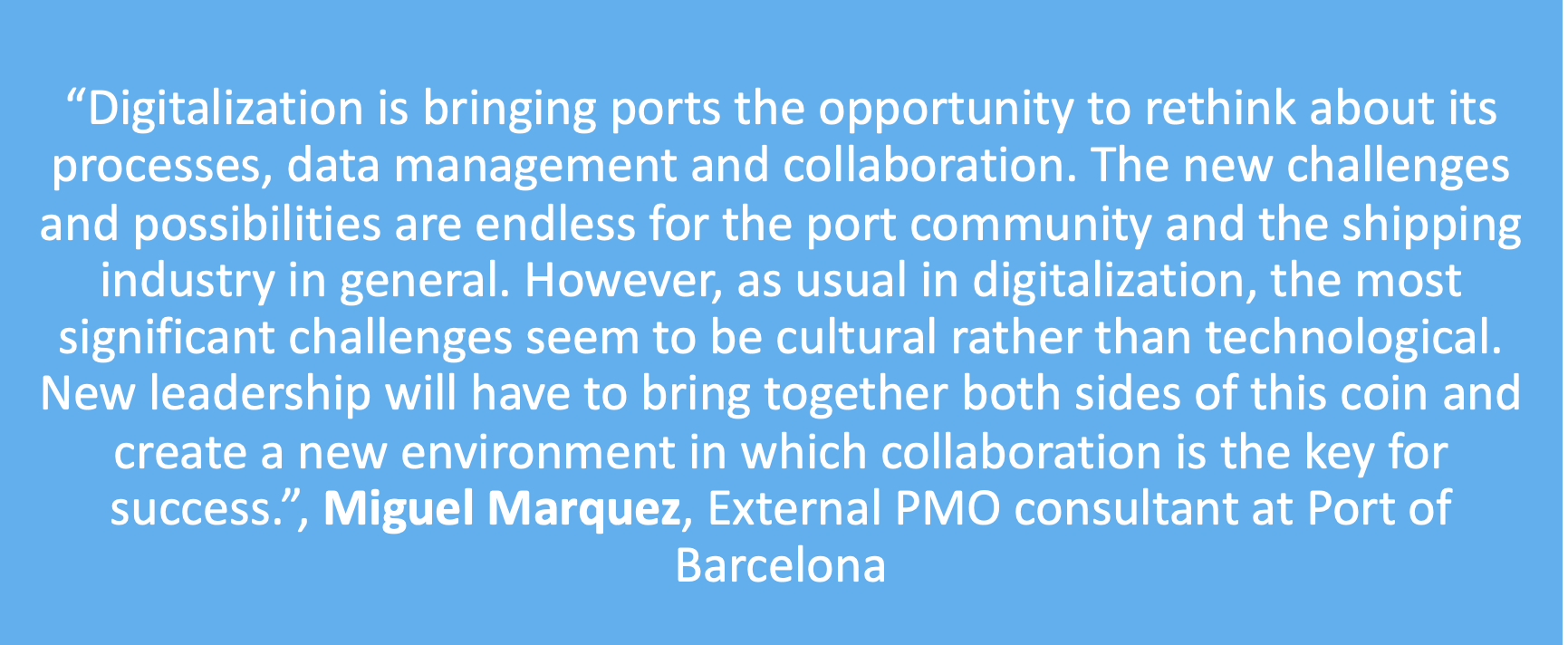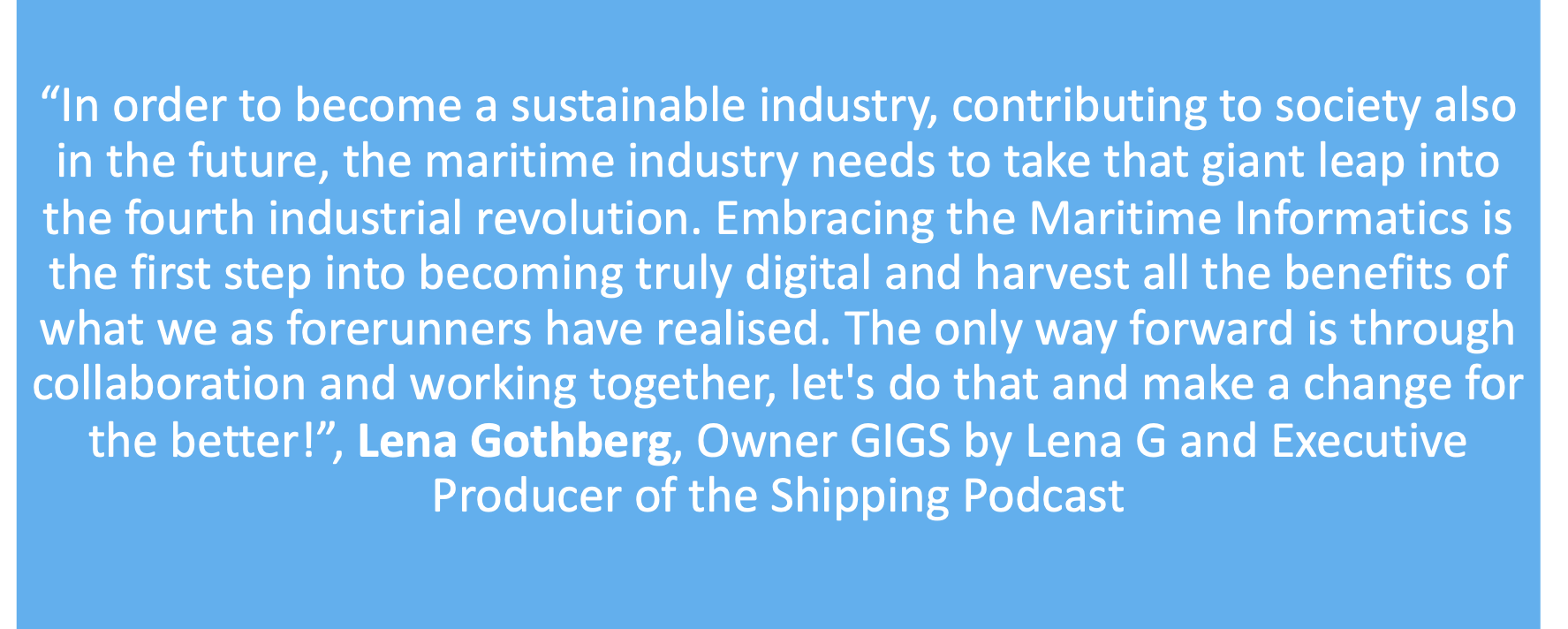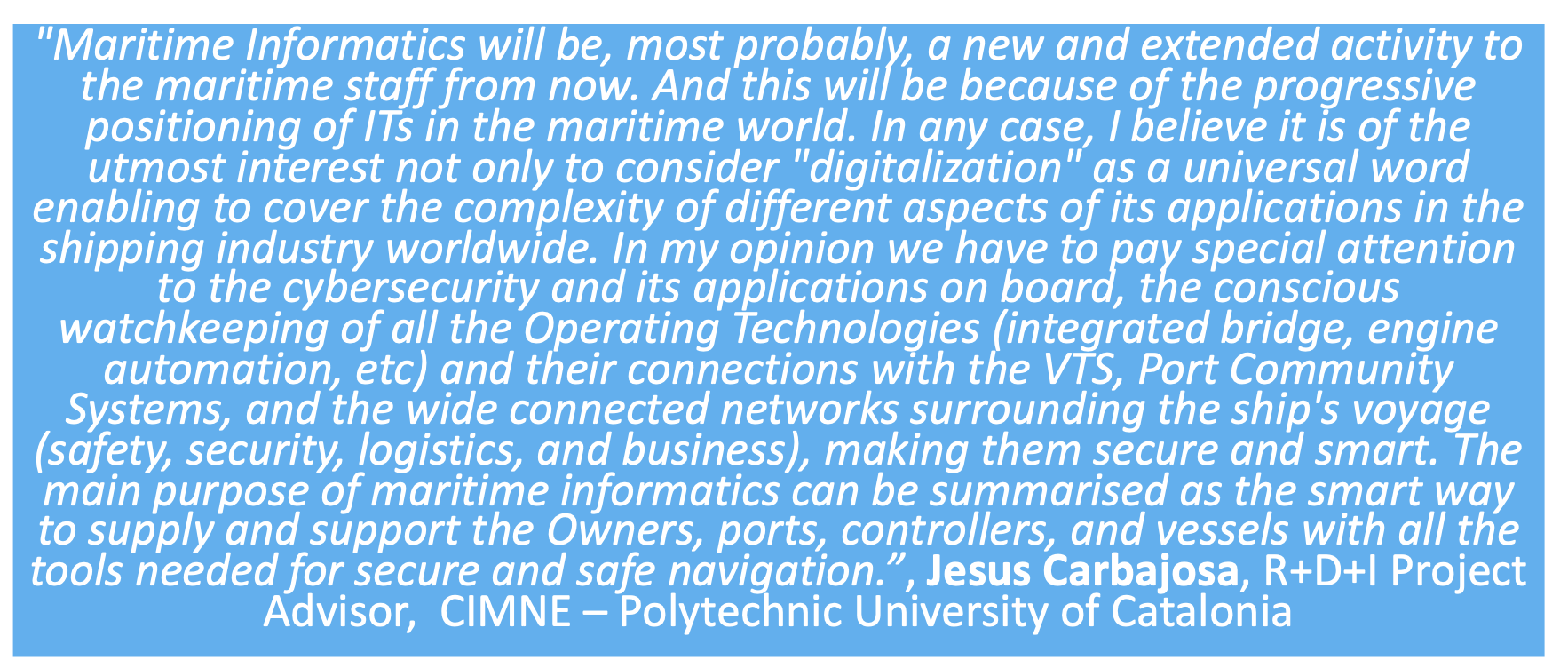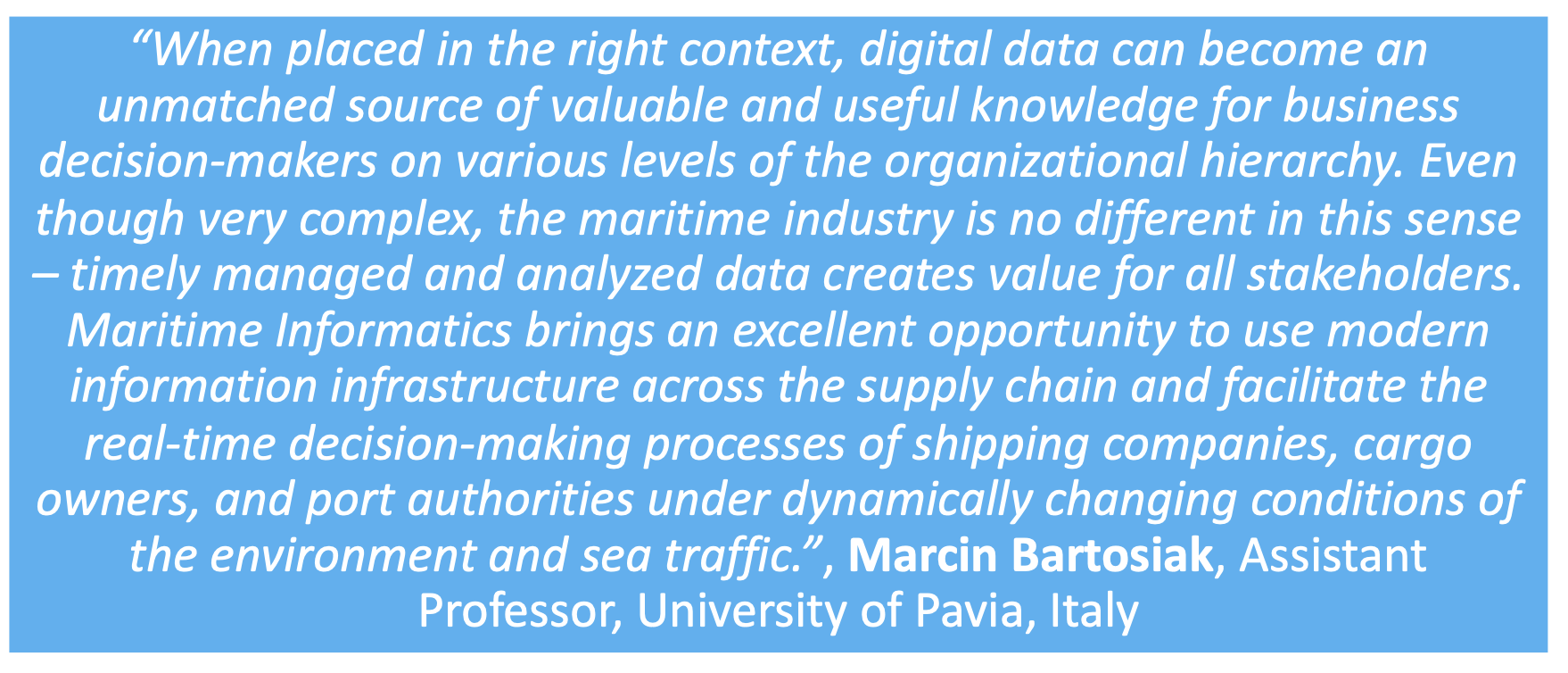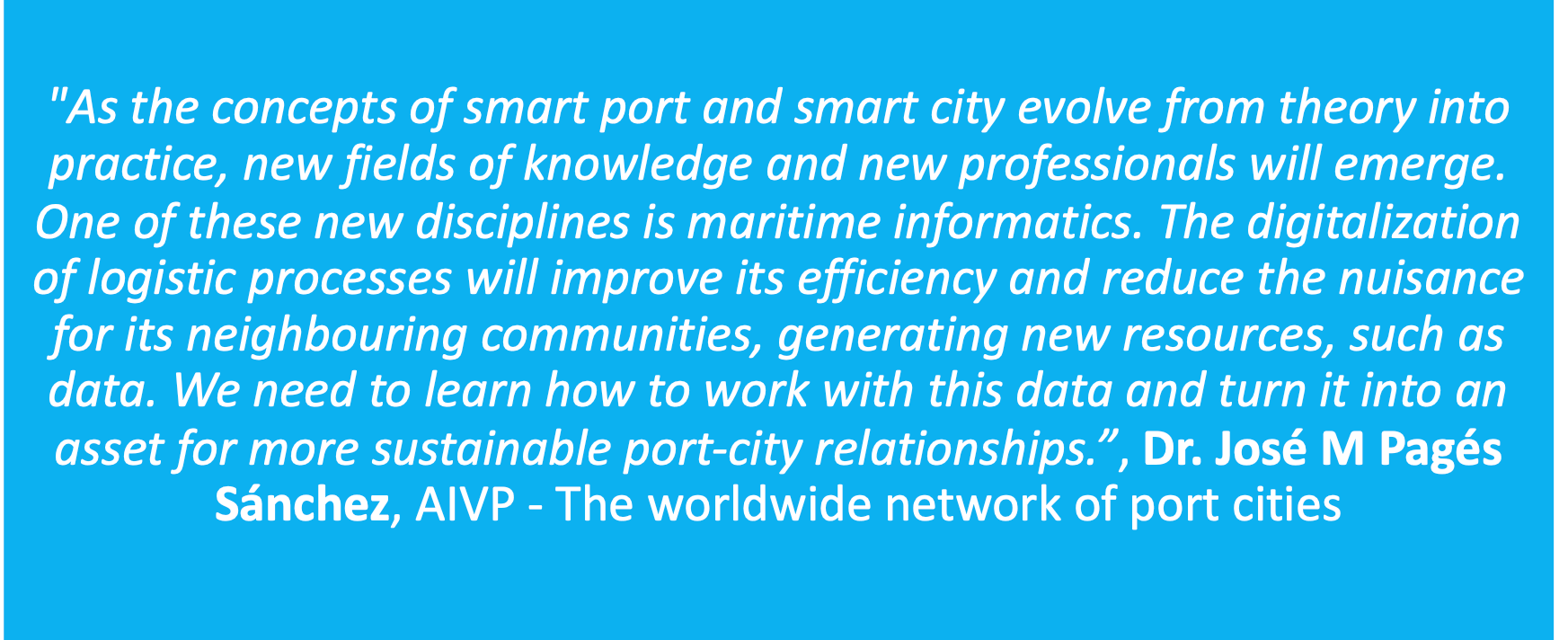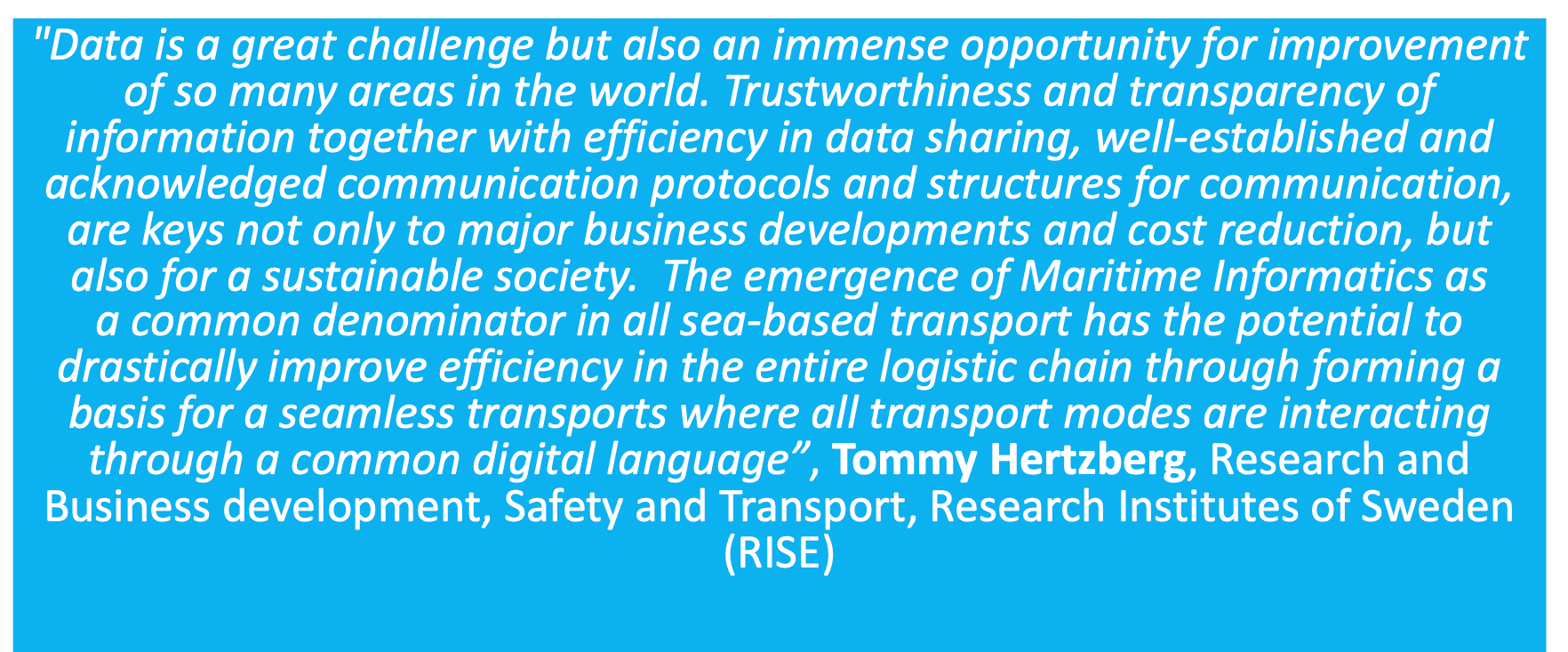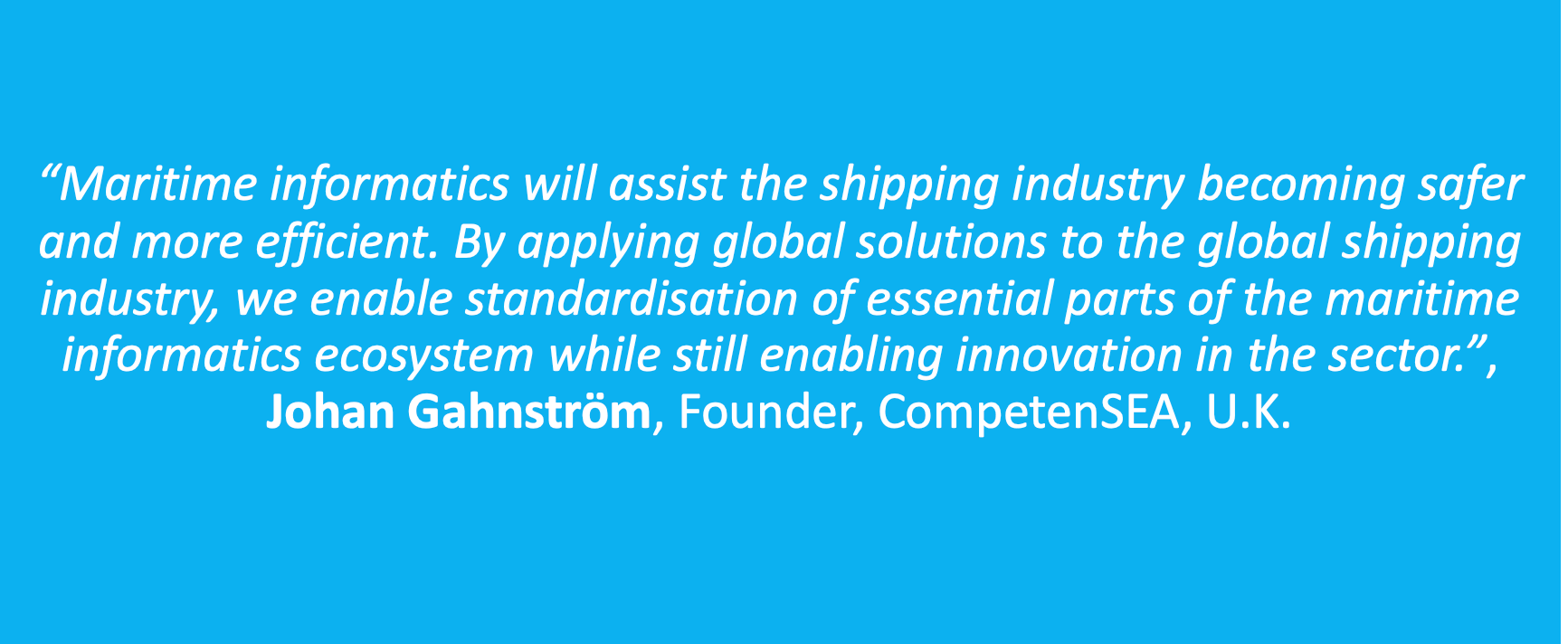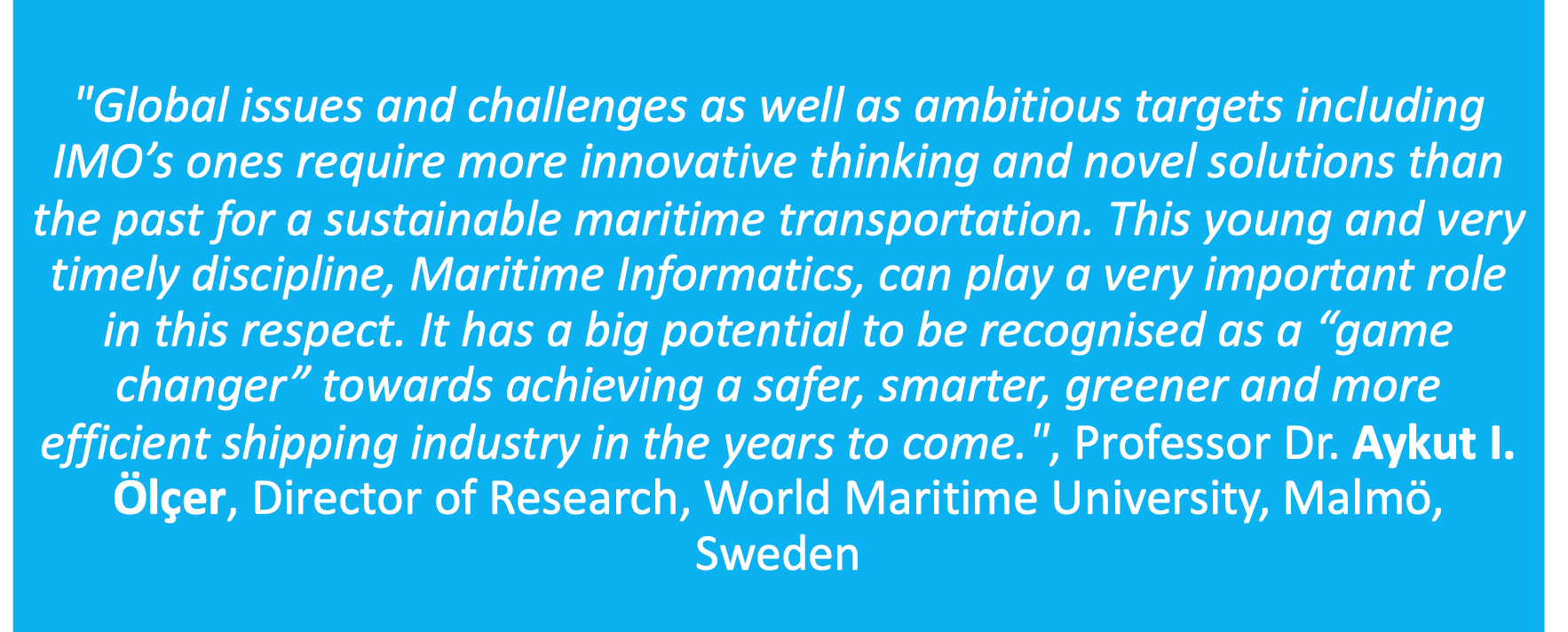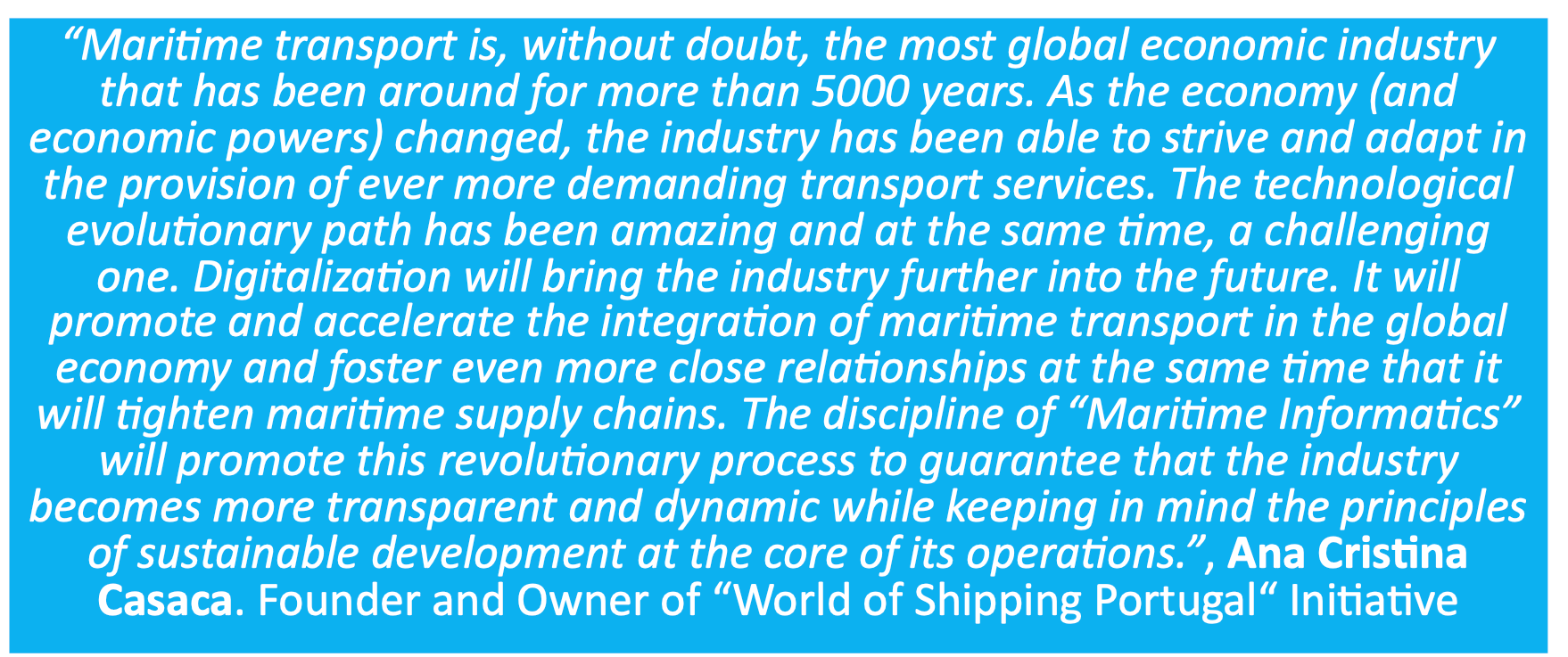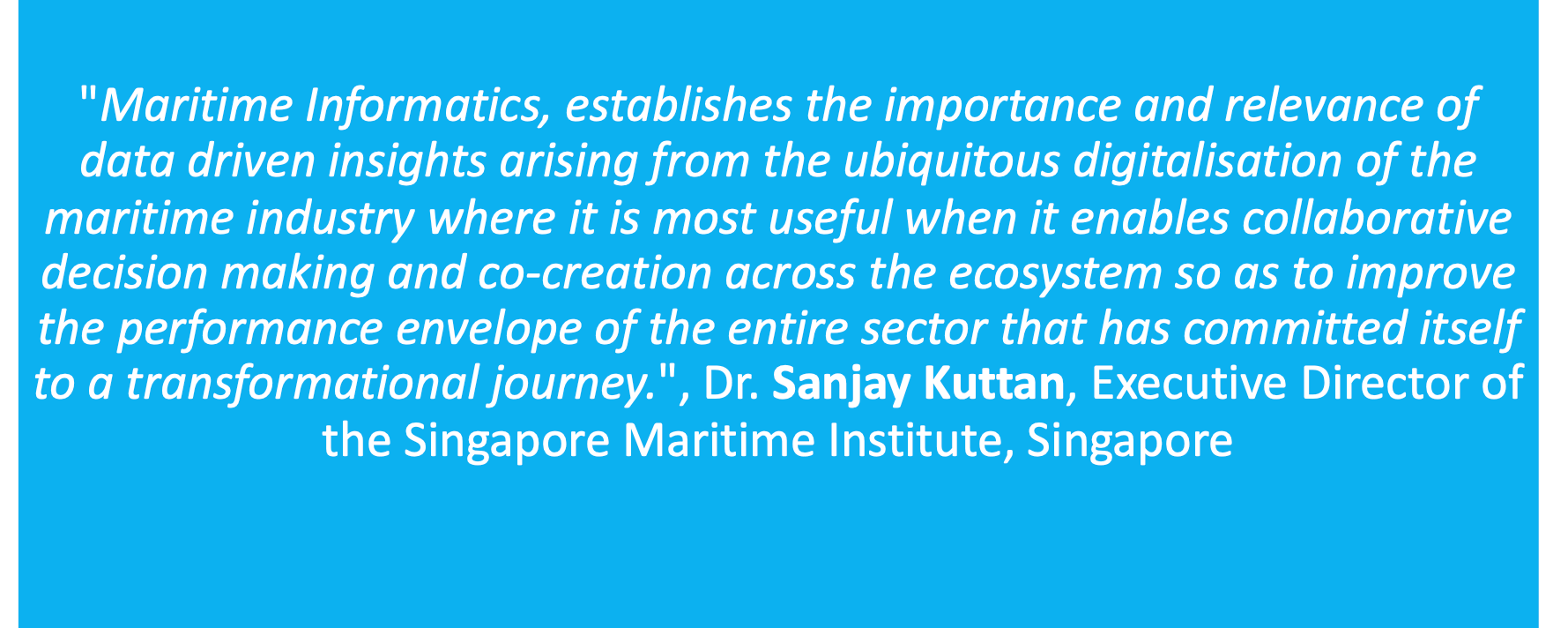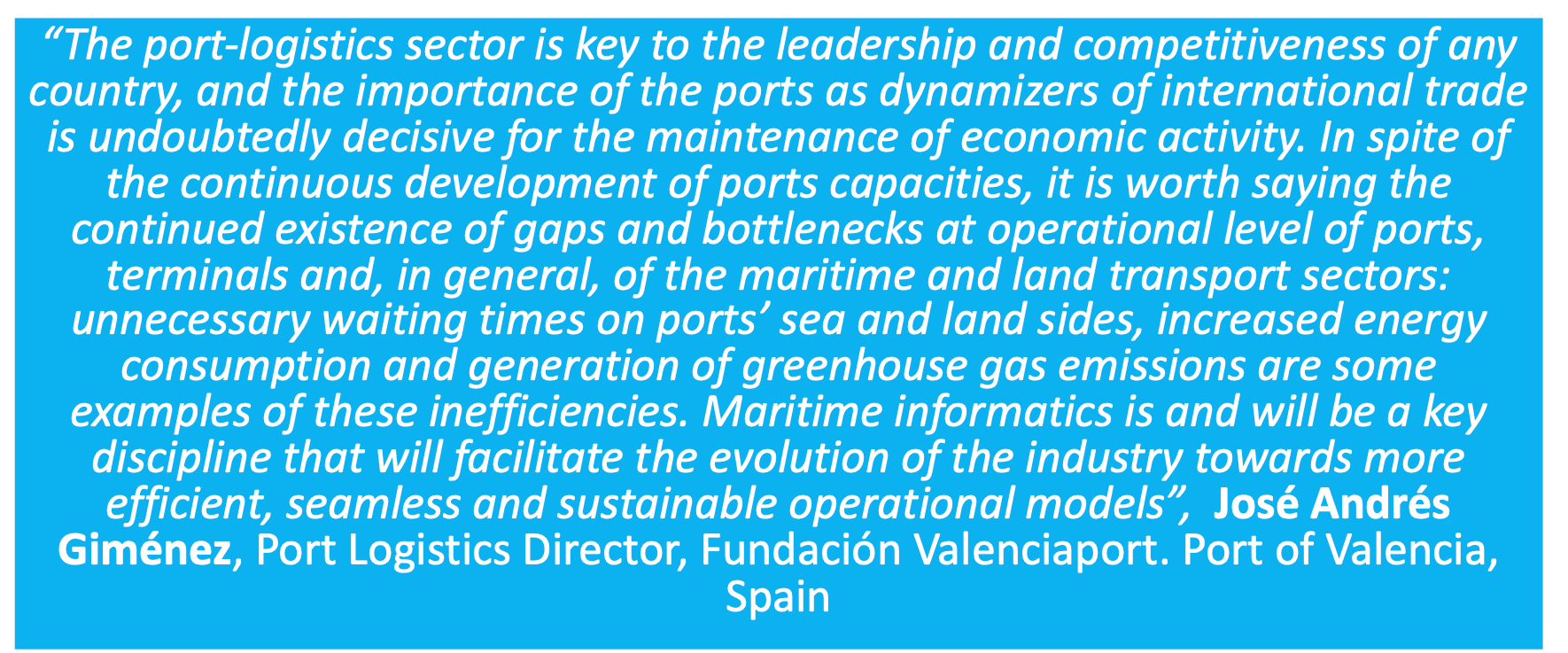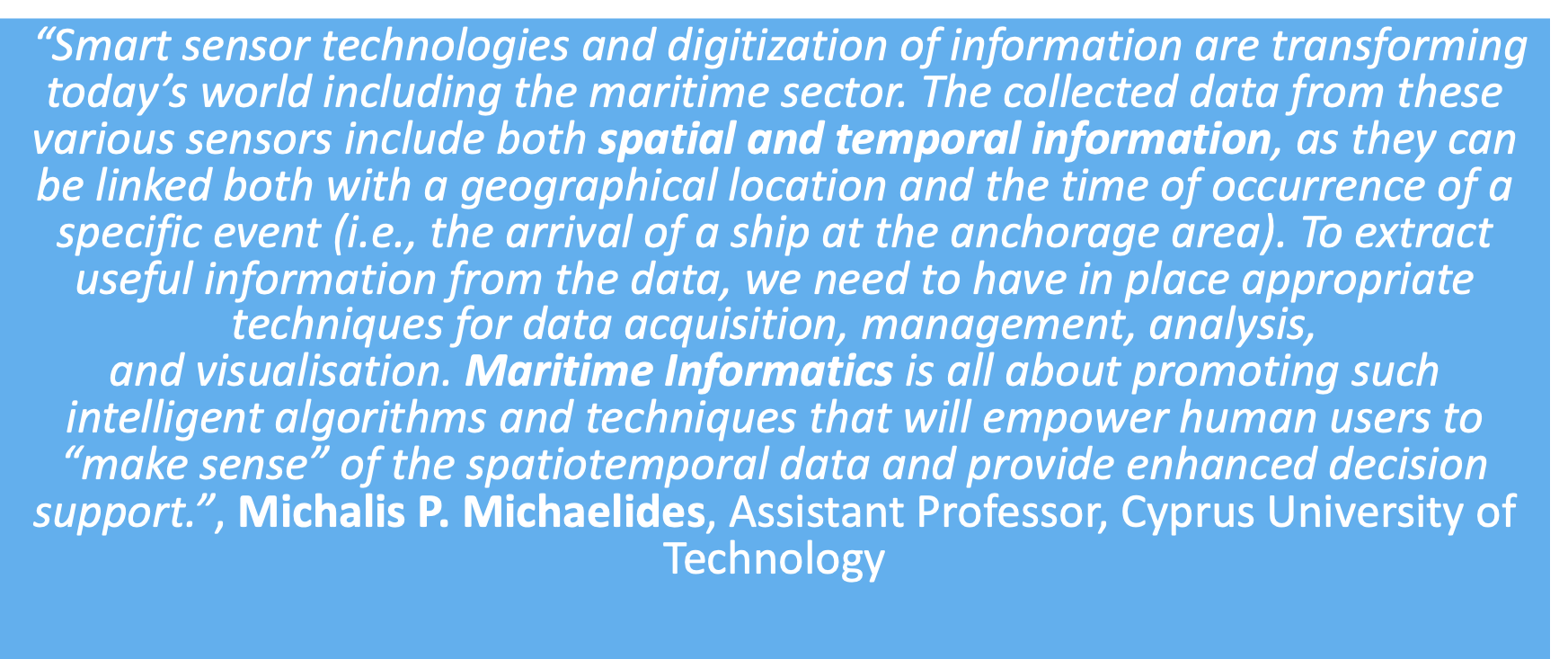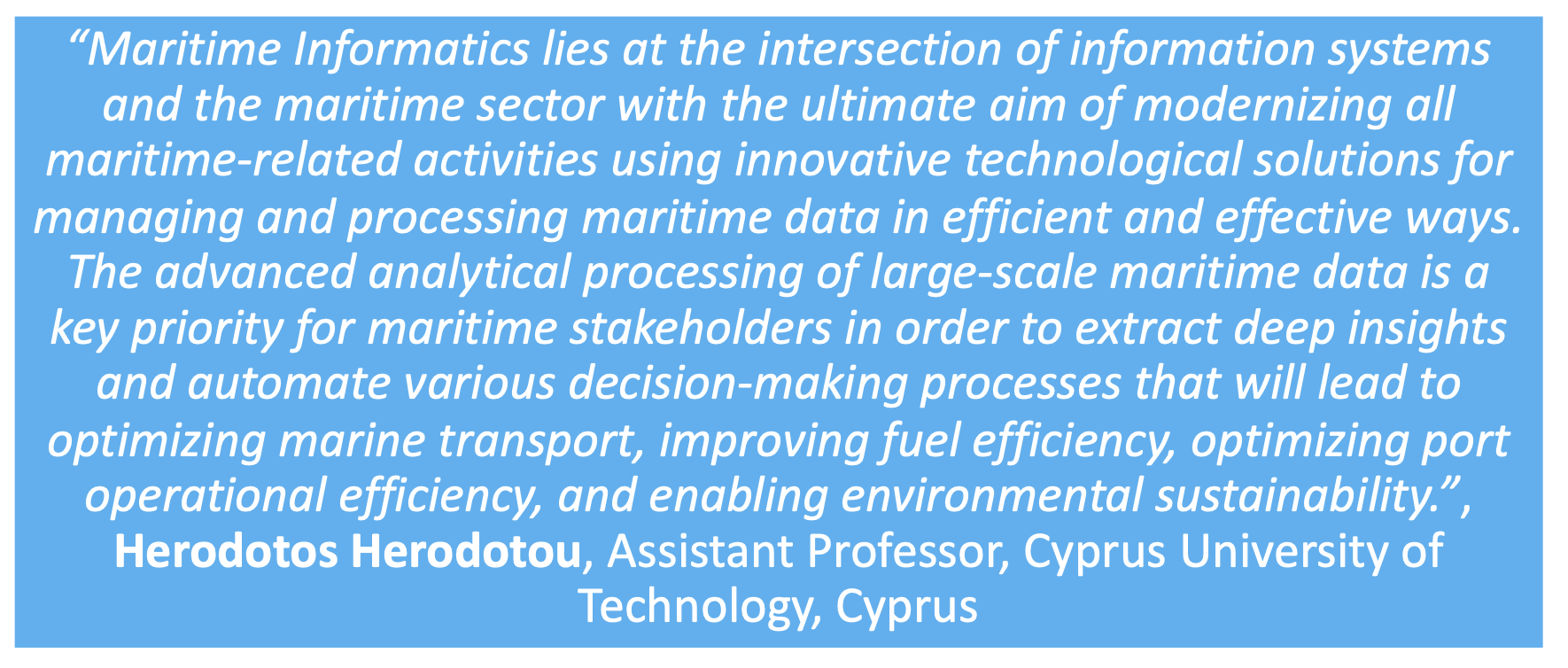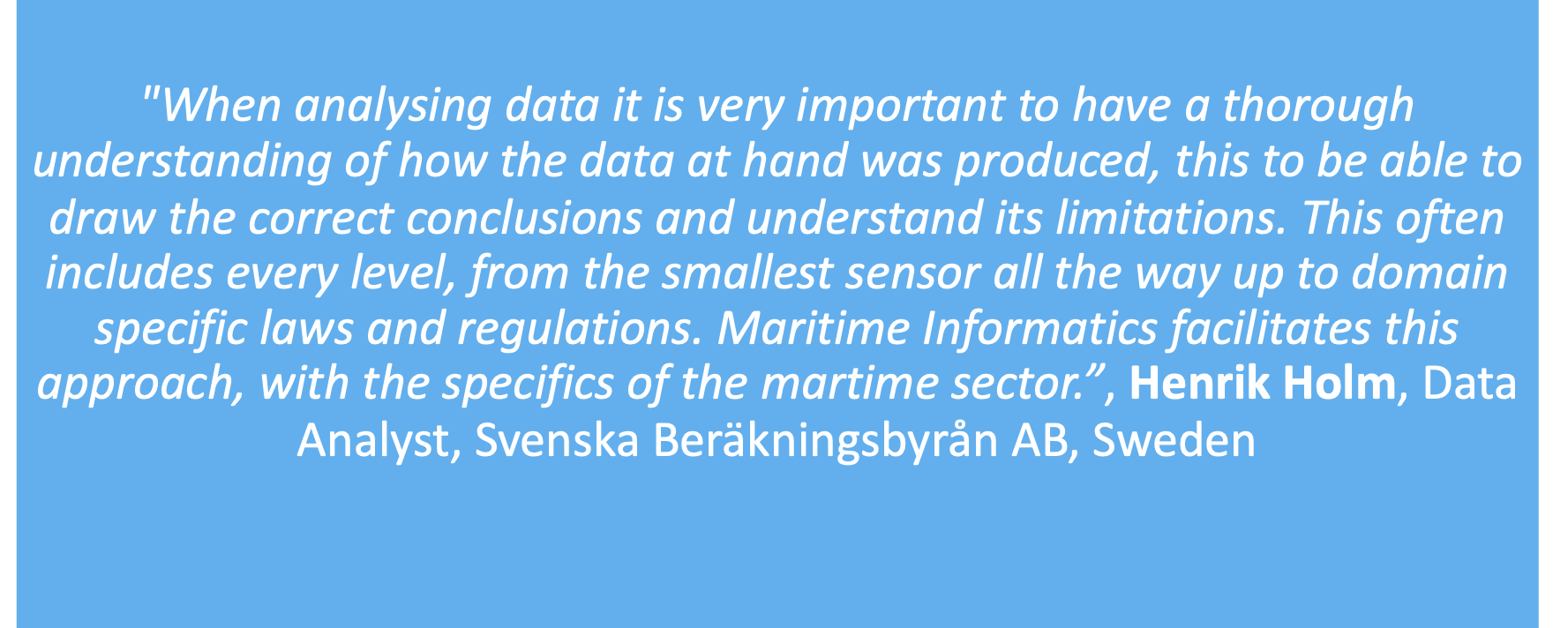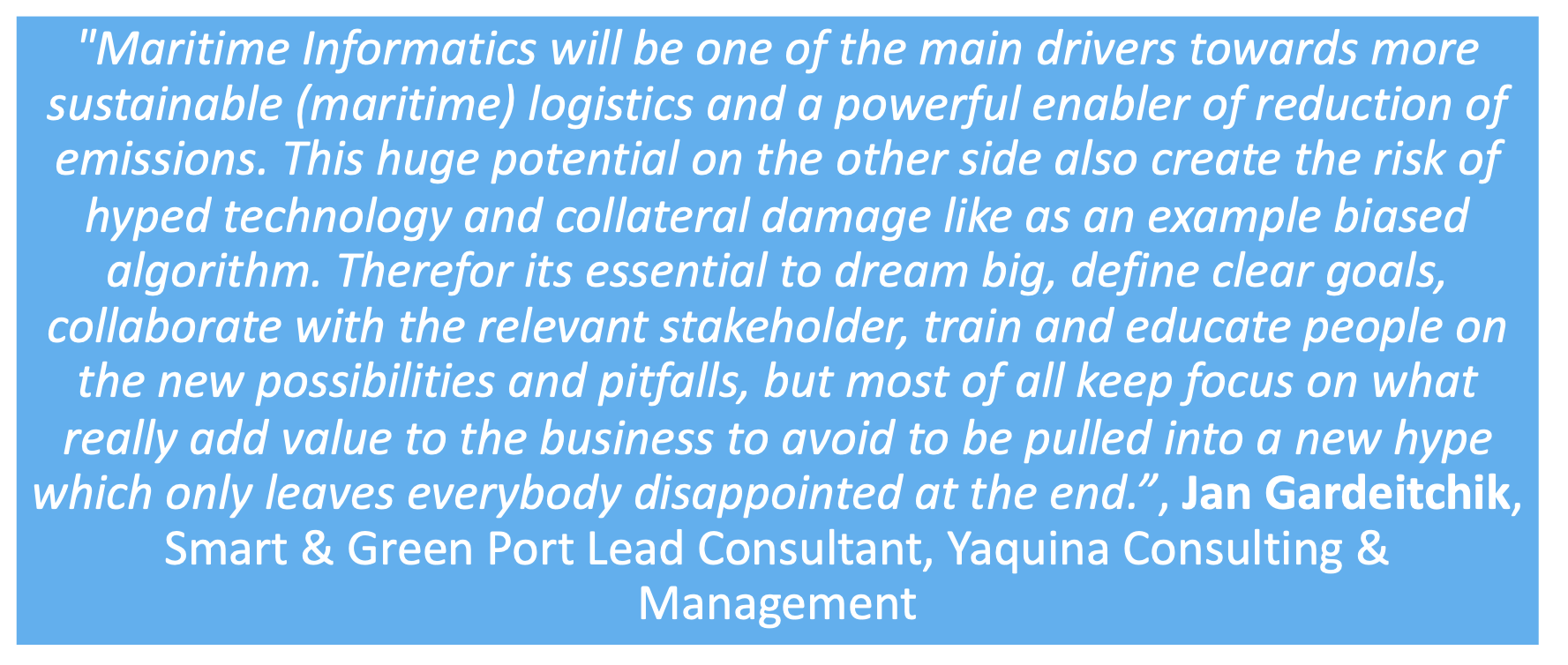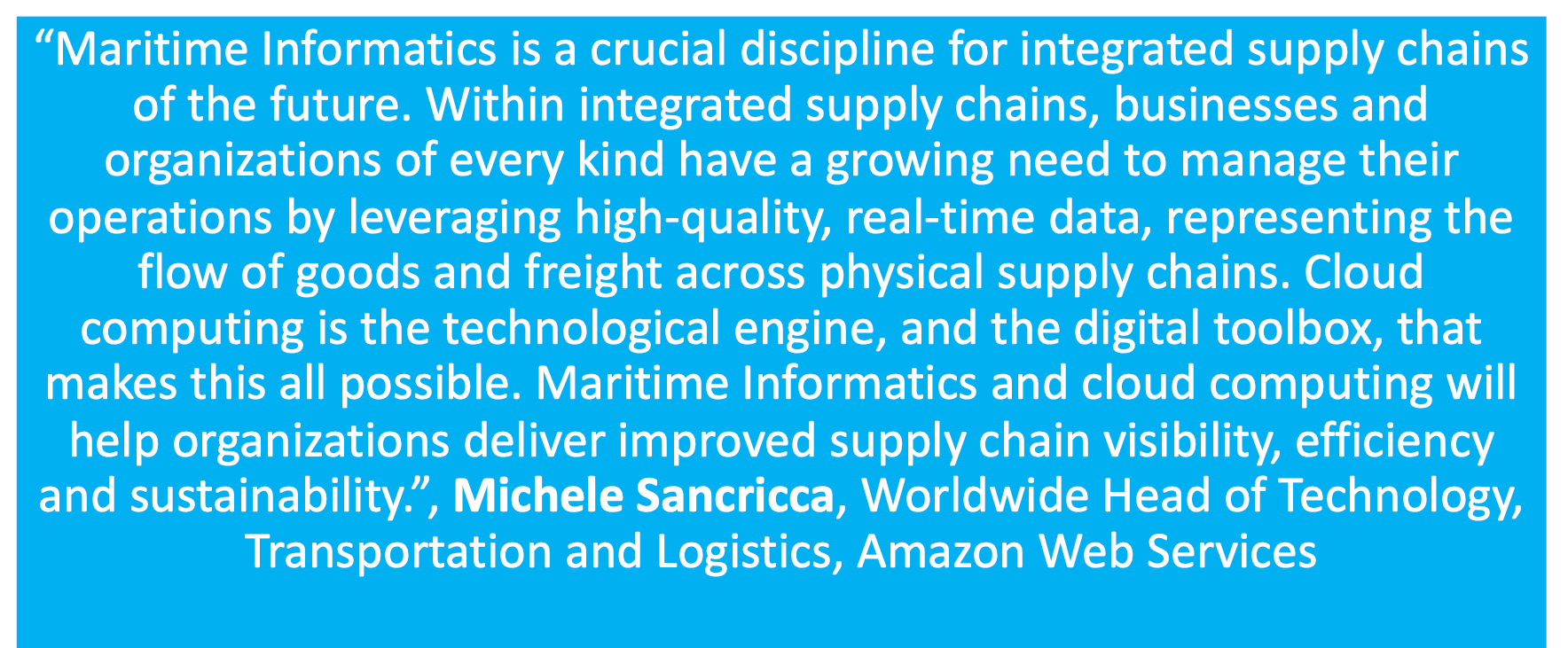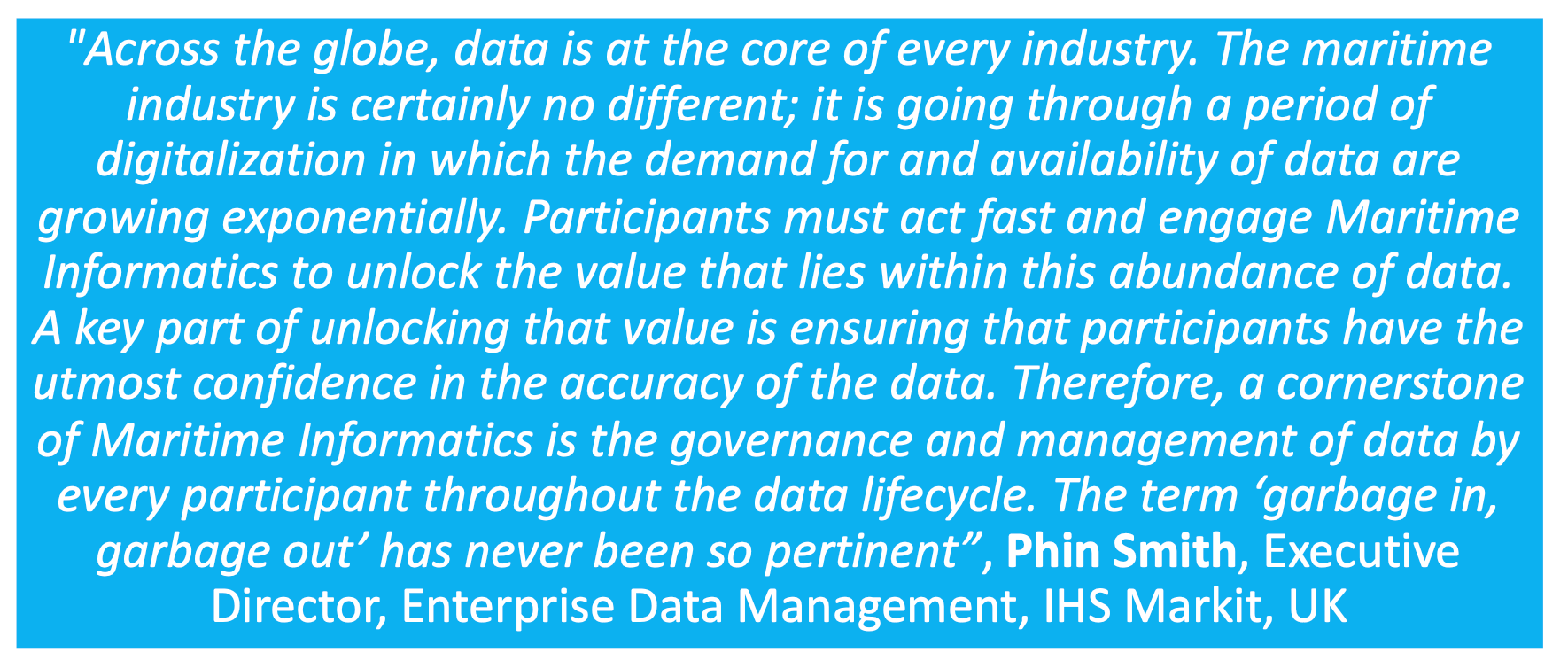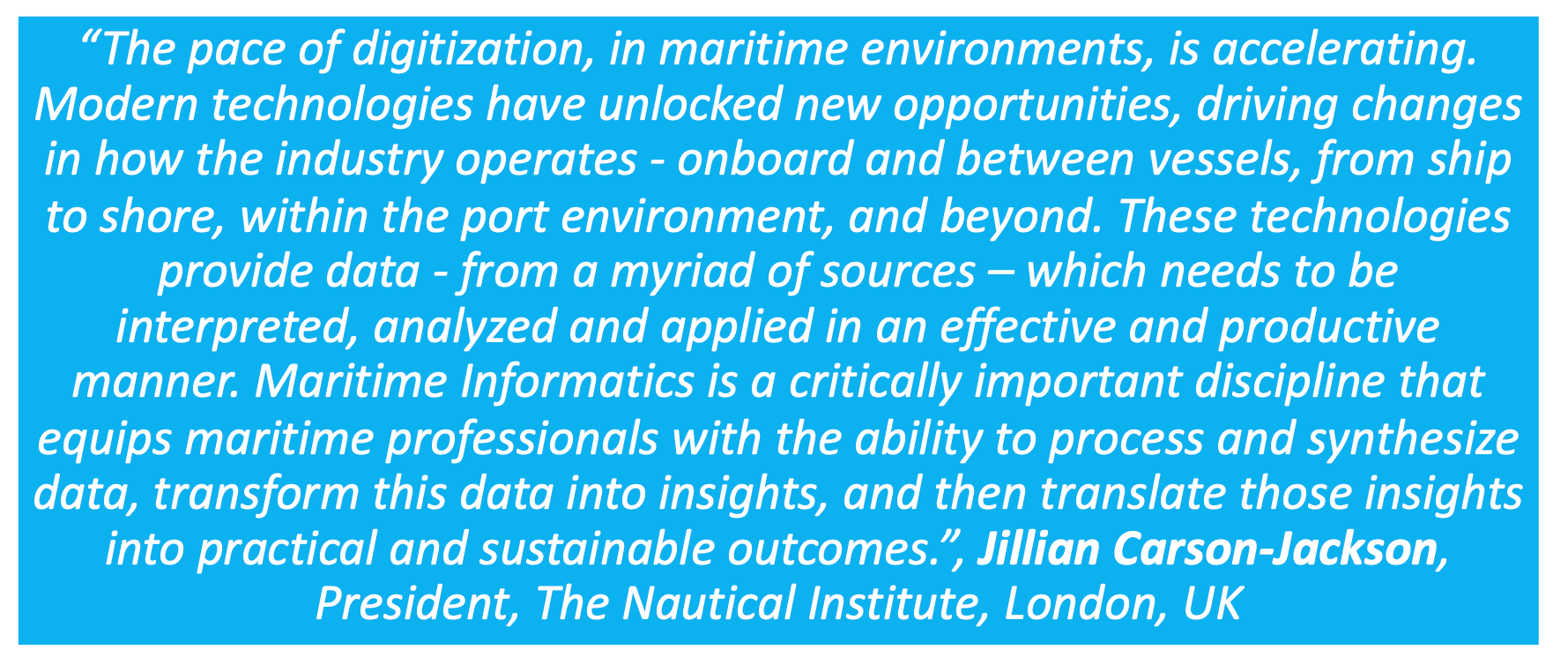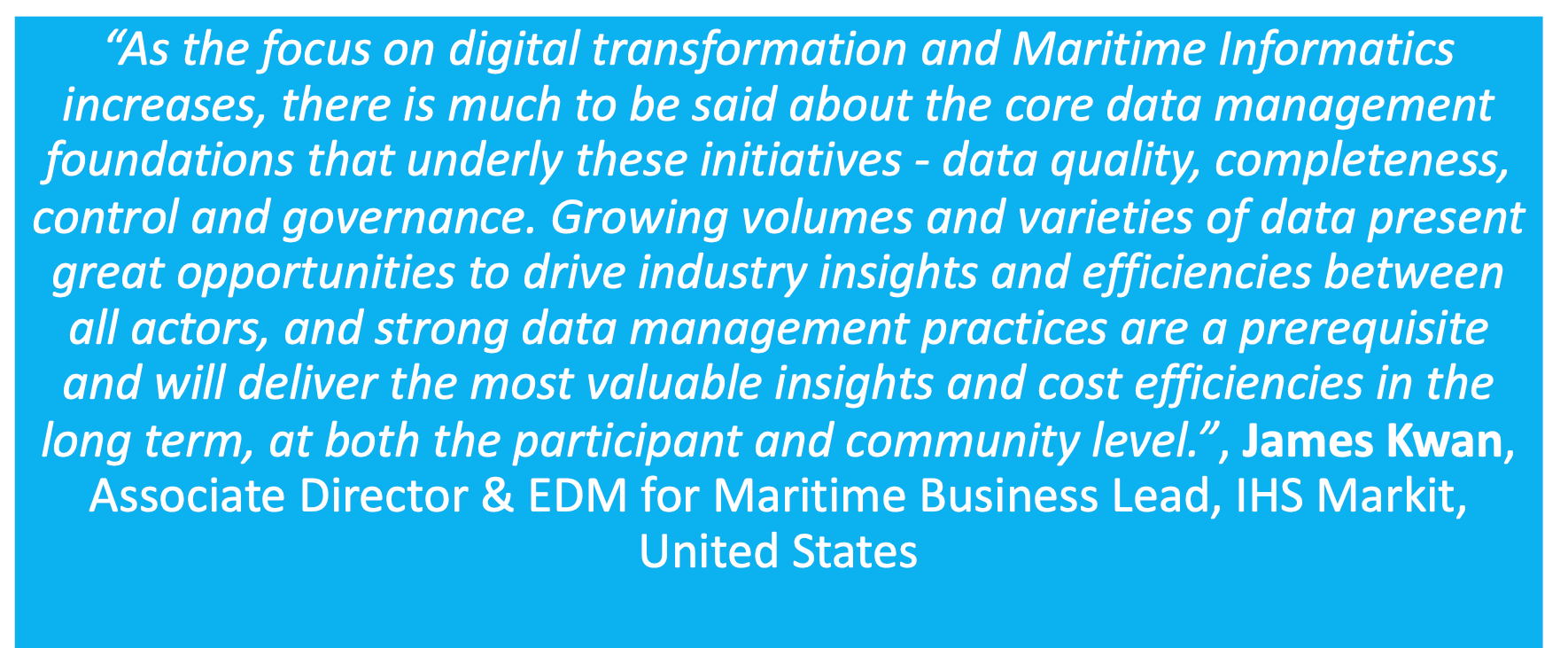Last updated on May 20th, 2021 at 11:28 am
Author Archives: Sukhjit Singh
Maritime Informatics Additional Perspectives and Applications
Last updated on May 26th, 2021 at 08:48 am
Call for papers
Last updated on February 21st, 2021 at 11:20 am
Data Management
Lind M., Kwan J., Smith P., Becha H., Liesa F., Lindström P., Levy D., Sernick G. (2021) Data management empowering decision-making for enterprises in co-opetition, Smart Maritime Network, 2021-02-11 (https://smartmaritimenetwork.com/2021/02/11/empowering-decision-making-for-enterprises-in-co-opetition-through-data-management/)
PRESS RELEASE
Last updated on November 14th, 2021 at 01:02 pm
Contributors to the first book on Maritime Informatics
Editors
Lind M., Research Institutes of Sweden (RISE) and Chalmers University of Technology, Sweden (https://www.linkedin.com/in/mikael-lind-7a0ba218/ )
Michaelides M., Cyprus University of Technology, Cyprus (https://www.linkedin.com/in/michalis-michaelides-00867290/ )
Ward R., Secretary-General emeritus of the International Hydrographic Organization, Australia (https://www.linkedin.com/in/robert-ward-472a94109/ )
Watson R.T., University of Georgia, USA (https://www.linkedin.com/in/richard-watson-a183941/ )
Foreword
Probert S., Chair UN/CEFACT, United Kingdom (https://www.linkedin.com/in/sueprobert/ )
Thompson L., Secretary, UN/CEFACT – United Nations Economic Commission for Europe, Switzerland (https://www.linkedin.com/in/lance-thompson-642b5bb/ )
Chapters
Alexandrou A. E., Queen Mary University of London / Jackson Parton Solicitors, United Kingdom
Alexandrou S. E., Cyprus University of Technology (CUT), Cyprus
Andersen T., NOFO, Norway (https://www.linkedin.com/in/trond-andersen-14743835/ )
Askvik J., ShortSea Promotion Centre Norway, Norway (https://www.linkedin.com/in/jørn-askvik/ )
Aslam S., Cyprus University of Technology, Cyprus (https://www.linkedin.com/in/sheraz-aslam-2148bab4/ )
Bartosiak M. L., Università di Pavia, Italy (https://www.linkedin.com/in/bartosiak/ )
Becha H., UN/CEFACT Transport and Logistics Vice Chair, France (https://www.linkedin.com/in/hanane-becha-77664b1/ )
Bergmann M., BM Bergmann-Marine, Germany(https://www.linkedin.com/in/bergmann-michael/ )
Bjørn-Andersen N., Copenhagen Business School, Denmark (https://www.linkedin.com/in/niels-bjørn-andersen-49253/ )
Breitenbach S., Port of Hamburg Marketing, Germany (https://www.linkedin.com/in/stefan-breitenbach-hh/ )
Brendel A. B., University of Göttingen, Germany (https://www.linkedin.com/in/alfred-benedikt-brendel-5358ba89/ )
Christensen T., Maritime Connectivity Platform Consortium, South Korea (https://www.linkedin.com/in/thomas-christensen-1318701/ )
Chrysostomou A., MarineFields Holding Ltd., Cyprus (https://www.linkedin.com/in/achrysostomou/ )
Chye Poh Chua, ShipsFocus Group, Singapore (https://www.linkedin.com/in/chye-poh-chua-bb022954/ )
Croston J. C., Manzanillo International Terminal, Panama (https://www.linkedin.com/in/juan-carlos-croston-34720aa/ )
Delmeire N., European Inland Waterway Transport, Belgium (https://www.linkedin.com/in/nik-delmeire-2b275b1/ )
Eklund E., Dubai Maritime City Authority, United Arab Emirates (https://www.linkedin.com/in/erik-eklund/ )
Forcellati Lillelund C., Risk Consulting/Sustainability, Singapore (https://www.linkedin.com/in/corradoforcellati/ )
Frazier T., FedEx Express, USA (https://www.linkedin.com/in/todd-frazier-421685b/ )
Fu X., IHPC A*Star, Singapore (https://www.linkedin.com/in/xiuju-fu-857a3311/ )
Gahnström J., CompetenSEA AB, Sweden (https://www.linkedin.com/in/johangahnstrom/ )
Georgeson C., Cass Business School at City University of London, United Kingdom (https://www.linkedin.com/in/claire-georgeson-91815b36/ )
González A., Barcelona Port Authority (APB), Spain (https://www.linkedin.com/in/albertgonzalezabian/ )
Göthberg L., GIGS by Lena G, Sweden (https://www.linkedin.com/in/lenagothberg/ )
Green L., ShortSea Promotion Centre Sweden, Sweden (https://www.linkedin.com/in/lars-green-711b813/ )
Green S., Swedish Shipowners’ Association, Sweden (https://www.linkedin.com/in/suzgreen/ )
Greve M., University of Göttingen, Germany (https://www.linkedin.com/in/maike-greve-8b78a114a/ )
Hägg M., Research Institutes of Sweden (RISE), Sweden
Haraldson S., Research Institutes of Sweden (RISE), Sweden (https://www.linkedin.com/in/sandra-haraldson-62757415/ )
Harnischmacher C., University of Göttingen, Germany (https://www.linkedin.com/in/christine-harnischmacher-1365b21b9/ )
Hayes D., Cyprus Subsea Consulting and Services C.S.C.S. Ltd., Cyprus
Herodotou H., Cyprus University of Technology, Cyprus (https://www.linkedin.com/in/herodotosherodotou/ )
Hirt G., HVCC Hamburg Vessel Coordination Center, Germany (https://www.linkedin.com/in/gerald-hirt-7493a25/ )
Hoffmann J., UNCTAD, Switzerland (https://www.linkedin.com/in/drjanhoffmann/ )
Holm H., Svenska Beräkningsbyrån AB, Sweden (https://www.linkedin.com/in/henrik-holm-37923a58/ )
Hvid Jensen H., Henrik Hvid Consult, Denmark (https://www.linkedin.com/in/henrikhvid/ )
Jayaraman V., IHPC A*Star Computing, Singapore (https://www.linkedin.com/in/vasundharajayaraman/ )
Karlsson J., ABB Marine & Ports, Sweden (https://www.linkedin.com/in/jorgen-karlsson-b8722110/ )
Karlsson M., Research Institutes of Sweden (RISE), Sweden (https://www.linkedin.com/in/mathias-karlsson-96565344/ )
Kolbe L. M., University of Göttingen, Germany (https://www.linkedin.com/in/lutz-kolbe-b12014b/)
Kyriakides I., University of Nicosia Research Foundation, Cyprus (https://www.linkedin.com/in/ioannis-kyriakides/ )
Liesa F., ETP-Alice, Belgium (https://www.linkedin.com/in/fernandoliesa/)
Lind M., Research Institutes of Sweden (RISE) and Chalmers University of Technology, Sweden (https://www.linkedin.com/in/mikael-lind-7a0ba218/ )
Michaelides M., Cyprus University of Technology, Cyprus (https://www.linkedin.com/in/michalis-michaelides-00867290/ )
O’Malley S., Analytical Innovative Solutions, LLC, USA (https://www.linkedin.com/in/steve-o-malley-b752b712/ )
Olindersson F., Chalmers University of Technology, Sweden (https://www.linkedin.com/in/fredrik-olindersson-1039337/ )
Olsson E., Research Institutes of Sweden (RISE), Sweden (https://www.linkedin.com/in/eddieolsson/ )
Othman N. B., IHPC A*Star, Singapore
Pagés Sánchez J.M., AIVP – The Worldwide Network of Port Cities, Germany (https://www.linkedin.com/in/josempsanchez/ )
Panayides P., Cyprus University of Technology (CUT), Cyprus
Park J. H., KRISO, South Korea (https://www.linkedin.com/in/jin-hyoung-park-07b3508a/ )
Paulsen S., Pragmatique Denmark, Denmark (https://www.linkedin.com/in/svendpaulsen/ )
Penttinen T., Attracs / Ahola Transport, Finland (https://www.linkedin.com/in/toni-penttinen-2426743/ )
Pot F. W., BM Bergmann-Marine, USA (https://www.linkedin.com/in/fred-pot-7841a56/ )
Primor O., Windward, Israel (https://www.linkedin.com/in/omer-primor/ )
Rudolfsson P., Kvarken Ports, Sweden (https://www.linkedin.com/in/patrik-rudolfsson-a4b69580/ )
Rydbergh T., Marine Benchmark, Sweden (https://www.linkedin.com/in/torbjornrydbergh/ )
Rygh T., The City of Stavanger, Norway (https://www.linkedin.com/in/terje-rygh-a6b53660/ )
Schmitt P., BearingPoint GmbH, Germany (https://www.linkedin.com/in/schmittpatrick/ )
Schröder M., Hapag-Lloyd AG, Germany (https://www.linkedin.com/in/michael-schroeder-2903722/ )
Sengupta B., OSM Shipmanagement, Singapore (https://www.linkedin.com/in/bhaskarsengupta081165/ )
Simha A., MSC Mediterranean Shipping Company, Switzerland (https://www.linkedin.com/in/andresimha/ )
Singh S., The University of Trinidad and Tobago, Trinidad & Tobago (https://www.linkedin.com/in/captain-sukhjit-singh-afni-91838344/ )
Siokouros Z., Cyprus Marine and Maritime Institute (CMMI), Cyprus (https://www.linkedin.com/in/zacharias-siokouros-02aa4512/ )
Sjöberger C., Chalmers University of Technology, Sweden (https://www.linkedin.com/in/carl-sjöberger-b5303714/ )
Theodosiou D., Tototheo Maritime and WISTA, Cyprus (https://www.linkedin.com/in/despina-panayiotou-theodosiou-30726b28/ )
Theodossiou S., Tototheo Maritime, Cyprus (https://www.linkedin.com/in/socrates-theodossiou-1514371/ )
Thomas D., Kennesaw State University, USA (https://www.linkedin.com/in/dominict/ )
Tichavska M., MarineTraffic, United Kingdom (https://www.linkedin.com/in/mtichavska/ )
Tsiantis P., University of Nicosia Research Foundation, Cyprus
von Elern F., Swedish Maritime Technology Forum (SMTF) a part of Research Institutes of Sweden (RISE), Sweden (https://www.linkedin.com/in/fredrik-von-elern-10378046/ )
Voorspuij J. M., GS1 AISBL, Belgium (https://www.linkedin.com/in/jacovoorspuij/ )
Ward R., Secretary-General emeritus of the International Hydrographic Organization, Australia (https://www.linkedin.com/in/robert-ward-472a94109/ )
Watson R.T., University of Georgia, USA (https://www.linkedin.com/in/richard-watson-a183941/ )
Woxenius J., University of Gothenburg, Sweden (https://www.linkedin.com/in/johan-woxenius-3948a94/ )
Wulff B., HHLA Container Terminal Altenwerder GmbH, Germany
Xiao Z., IHPC A*Star, Singapore (https://www.linkedin.com/in/xiaozhejesse/ )
Xu H., IHPC A*Star, Singapore
Zerem A., Research Institutes of Sweden (RISE), Sweden (https://www.linkedin.com/in/almir-zerem/ )
Training
Last updated on January 25th, 2022 at 06:36 am
RESOURCES
Last updated on June 4th, 2021 at 07:22 am
Research – practice collaboration
Last updated on June 19th, 2023 at 03:49 pm
Data analytics
Last updated on November 5th, 2022 at 04:50 am

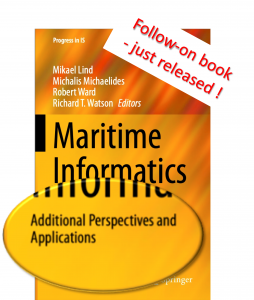 Building upon the first book Maritime Informatics, this book addresses some of the most recent practical developments and experiences, particularly from a global perspective.
Building upon the first book Maritime Informatics, this book addresses some of the most recent practical developments and experiences, particularly from a global perspective.